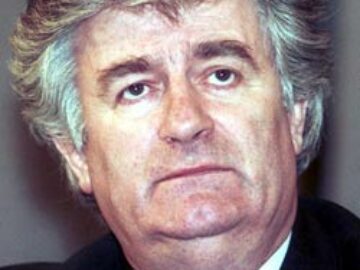Karadzic flown to Hague tribunal

The former Bosnian Serb leader, Radovan Karadzic, has arrived in the Netherlands to face trial before a UN war-crimes tribunal in The Hague. Mr Karadzic, arrested in Belgrade last week after 13 years on the run, will appear before the tribunal on Thursday.
He has been indicted for crimes against humanity and genocide during the Bosnian conflict of the 1990s.
It comes hours after clashes at a rally attended by at least 10,000 supporters to protest about his arrest.
More than 40 people – most of them police officers – were injured in clashes during the final speeches at the rally organised by the hardline nationalist Radical Party.
Riot police fire tear gas at protesters armed with stones and burning flares.
Failed appeal
Mr Karadzic is expected to appear in court on Thursday, when he will hear the charges against him.
He will be allowed to enter a plea immediately or take 30 days to do so.
Mr Karadzic left a court building in Belgrade at 0345 (0145 GMT), in a convoy of cars with tinted windows.
Inside the UN detention centre in The Hague
He then took a special flight to Rotterdam airport in the Netherlands, from where he was transferred to the UN’s detention unit.
Under normal procedure, he would be read his rights, fingerprinted and photographed, and then undergo a medical examination.
The 63-year-old had attempted to challenge the legality of his transfer.
An appeal, sent by post on Friday, had still not been received by the Serbian court on Tuesday, prompting Serbia’s justice minister to issue the final extradition order.
Mr Karadzic was arrested on 21 July in Belgrade. He had changed his appearance, having grown a long beard, and was working as an alternative therapist.
EU pressure
Mr Karadzic led the formation of a separate Bosnian Serb assembly in 1991 – one of the sparks that ignited the 1992-1995 Bosnian war.
THE CHARGES
Eleven counts of genocide, war crimes, crimes against humanity and other atrocities
Charged over shelling Sarajevo during the city’s siege, in which some 12,000 civilians died
Allegedly organised the massacre of up to 8,000 Bosniak men and youths in Srebrenica
Targeted Bosniak and Croat political leaders, intellectuals and professionals
Unlawfully deported and transferred civilians because of national or religious identity
Destroyed homes, businesses and sacred sites
He has been indicted for crimes against humanity and genocide over the massacre of up to 8,000 mainly Muslim Bosniaks at Srebrenica in 1995.
He has also been charged over the shelling of Sarajevo, and the use of 284 UN peacekeepers as human shields in May and June 1995.
On Tuesday, EU ambassadors meeting in Brussels decided to defer a decision on unfreezing trade benefits until Mr Karadzic was transferred to The Hague.
Diplomats from the 27 EU member states also said they would wait for a report by the UN war crimes prosecutor Serge Brammertz on whether Serbia was fully co-operating with the court – a condition necessary for talks on Serbia’s possible membership to the EU.
The EU is also demanding the arrest of Mr Karadzic’s wartime military commander General Ratko Mladic, who remains at large.
